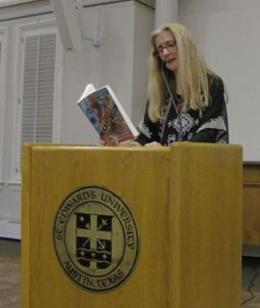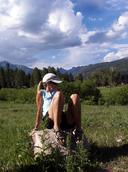Pamela Uschuk
contact me on Face Book
Pam with a young coyote rescued in Tennessee.
"Wild in the Plaza of Memory lives up to its title. With these poems, Uschuk has opened a public space where all things, all encounters--both beautiful and dreadful--are not only possible, they are inevitable. In this plaza of poetry, the poet moves effortlessly in time and space, addresses the living and conjures the dead, confesses personal losses publicly and public losses intimately. She, as Szymborska did before her,
questions poetry's place in the world, and, also like Szymborska, gives us an answer."
Daniel Nathan Terry
Reading at St. Edward's in Austin, Texas
Translated into over a dozen languages, Pam's work appears in over three hundred journals and anthologies worldwide, including POETRY, PARNASSUS REVIEW, AGNI REVIEW, and PLOUGHSHARES. Among Uschuk’s literary prizes are the 2011 War Poetry Prize from WINNING WRITERS (www.winningwriters.com), 2010 NEW MILLENIUM POETRY PRIZE, 2010 Best of the Web, the Struga Poetry Prize (for a theme poem), the Dorothy Daniels Writing Award from the National League of American PEN Women, The King’s English Prize as well as awards from the Chester H. Jones Foundation, IRIS, ASCENT and AMNESTY INTERNATIONAL.
Pam is available for readings and workshops. Negotiable fees.
Or call 970-903-7914
Pam has been a featured writer at the Prague Summer Programs, the 2011 Sha’ar Poetry Festival in Tel Aviv, Israel, the American Center in New Delhi, India, the University of Pisa, International Poetry Festivals in Malmo Sweden and Struga, Macedonia, the British School in Pisa, Italy, Vilenica in Slovenia, Gemini Ink Writers Festival, Meacham Writers Conference, Tucson Festival of the Book, Scandinavian Book Fair, Deep South Writers Conference, The Bridgewater International Poetry Festival, Babylon Salon as well as numerous universities and colleges, including New York University, Juilliard, Hunter College, Vassar College, Wake Forest, Kent State, Arizona State University, University of Montana, SUNY New Paltz, Central Florida University, University of New Mexico, as well as libraries and book stores across the country.
Pam is a Senior Black Earth Institute Fellow as well as Black Earth Institute Board Member. She was awarded a Writing Residency at Storyknife Women's Writers Retreat in Homer, Alaska for the month of September 2022.
News and Reviews for Pamela Uschuk
Pam in native habitat.
Wild in the Plaza of Memory is a fugue of love, politics and nature, all growing from one another, the three strands crackling with electricity where they touch. But these strands are never entirely separate. The ghost of Uschuk’s first and now deceased husband, a Vietnam Veteran, is reflected in the faces of two Latino Vietnam vets, one disabled, who are in danger of being deported because “…they cannot prove which side of the border they were on.” Of her nephew, she writes that his insomnia is “the flensed finches that chatter him awake.” Here nature blooms into empathy that is for Uschuk a form of love... There is no getting away from the things in life that make poetry; and what is healing is that poets, through their individual root systems, grow poetry and bring it into the world with a kind of spiritual coherence: it makes forms for the energy that might otherwise be frightening, that sends the flensed finches into our dreams. Uschuk understands this and her poems testify to it.
Nature in Uschuk’s poems is beautiful and fierce. Hers is not the heavily edited nature of executives vacationing in the Bahamas. It is elemental: “Wind’s so crazy in love with dust/this afternoon she’s writing her wild middle name/on the inside of ravens’ wings.” But this ferocity is also revivifying: “My love and I enter the far grotto/slick as vulva or oiled nipples,/heat woozed, the only couple/ inside this giant geode…”
Uschuk’s poetry is erotic in the true sense of the word, which is sexual but more than sexual; it makes love to life, it loves every instance of surprise to be found amid the attempts to control it, to poison it, to make is lesser than the beings who are a part of it: “Nothing saves me but this highway/cut through a desert where old volcanoes/remake themselves according to angles/of rainlight…” These are poems to help us become most like ourselves.
Doug Anderson, Conotations, 2013
Blood Flower:
American Book Award–winner Uschuk’s (Crazy Love, 2009) new collection of meditative, delectably powerful poems offers a steady and generous solace that serves as a platform for thought-provoking glimpses into spirit, family, and feeling. She has written of a tethered reality, commonplace secrets, and
emotional rescue. And she is political. Among the more than 40 poems, “Red Menace” (“After all of these years / it’s clear what it was / those teachers
couldn’t name— / not just the consonants but the roots, / the skin drums”) and “Black Swan” (“Grandfather, what purpose can you discern / now your entitled eyes are soil,/ your heart going to anthracite?”) are standouts. In the same vein as her contemporaries Patricia Smith and Joy Harjo, Uschuk is strong in metaphor, urgent in language, and powerful in vivisection.
— Mark Eleveld, Starred Review, Book List, 2015
October 1, 2018
ADVANCE PRAISE FOR REFUGEE: “With tenderness, expansive compassion, and profound gifts of radiant description, Pamela Uschuk considers so many ways people may be estranged and lost in this precious, difficult world. With brave ferocity, her poems in Refugee navigate new vision and reconnection, so desperately longed for right now and always.”
— Naomi Shihab Nye, author of The Tiny Journalist
Uschuk’s poetry collection calls out authoritarianism and social injustice. This moving collection of poems offer messages of hope as it addresses timely issues. It’s divided into four sections—“Skull Song,” “Axis,” “Liquid Book of the Dead,” and “Speaking of Angels and Ghosts”—and deals with a broad spectrum of hurt, from that felt by refugees and victims of racism to people struggling with cancer and victims of domestic abuse. The opening poem, “A History of Morning Clouds and Contrails,” exemplifies Uschuk’s distinct style, melding political outcry with a deep immersion in nature. The landscape she depicts is one drained by its struggles: “Feel the warmth of an otter’s last dive before ice takes the river. Police sirens fade like contrails across the exhausted heart of this land.” Meanwhile,poems such as “Intraperitoneal Chemo” offer an affectingly visceral tableau of cancer treatment: “the port sewn / onto my lower rib to pour toxins into my emptied womb.” Despite such challenging themes, a note of positivity rings true throughout, with one speaker declaring: “I will not border on hysteria but will work on a poem to feed all of us.” One of the most powerful poems, “Cracking One Hundred,” ingeniously juxtaposes the migration of the monarch butterfly with the immigration of people from Central America. Its opening line provocatively reads, “Near the border, preschoolers worry about butterflies. / How can they fly over the wall?” The poem memorably closes with an image of butterflies arriving from Mexico on the White House lawn, “on bright rose petals tended by hands / the same color as earth that nourishes them.”
Uschuk’s writing addresses worldwide injustices, although many salvos are clearly aimed at the Trump presidency, with
elegant, razor-sharp lines such as “this poem doesn’t have anything to do with comb-overs / or glacier eyes or gray suits
signing laws a jaguar wouldn’t stop to sniff.” Still, this is also a spellbindingly compassionate collection rooted in the belief
that redemption remains possible: “Earth carries us, heals our wounds as we spin on the hub of desire.”
A mordantly tender triumph rich with natural imagery.
Kirkus Review, November 2022





